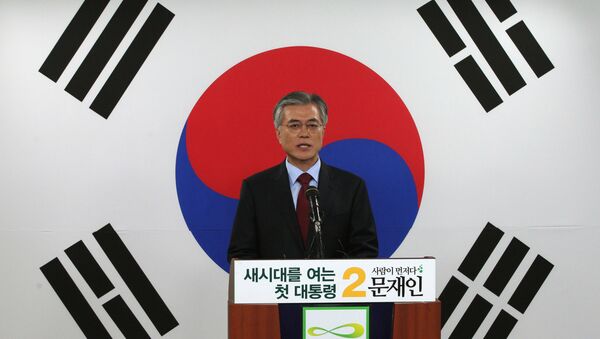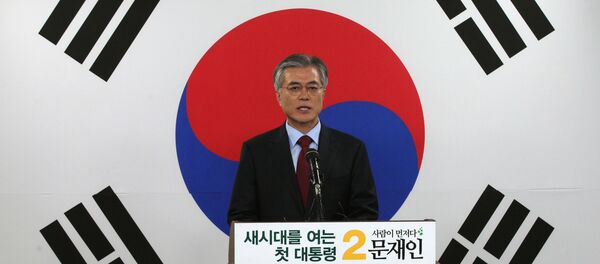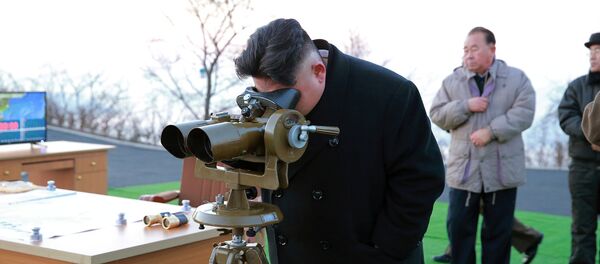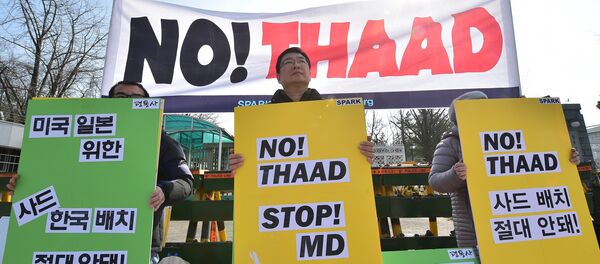It appears that the former head of the main opposition Democratic Party, Moon Jae-in, stands a good chance of winning the snap election, which is due to take place on May 9.
Moon has long been known for being skeptical of local conservatives' hawkish stance and called for a foreign policy shift, most notably in relations with North Korea. Moon advocates establishing a constructive dialogue with Pyongyang.
Speaking to Radio Sputnik, Dr. Go Myong-hyun, a research fellow at the Asian Institute for Policy Studies in Seoul, shed light on potential outcomes of the ongoing political struggle.
Dr. Go pointed out that in contrast to his conservative opponents, Moon enjoys a wide public support.
According to the recent poll conducted by the Korea Research Center for Yonhap News Agency and KBS broadcaster, Moon is leading the race with 29.9 percent; his competitor and fellow party member, Ahn Hee-jung, finished second with 17 percent.
That means that the liberal Democratic Party has a good prospect of retaking power, according to Dr. Go.
He pointed out that the conservatives have found themselves in an awkward position after their leader was ousted and left office in disgrace.
"There are no major conservative candidates in the running right now," Dr. Go told Radio Sputnik, adding that with only two months left before the snap election "it will be pretty difficult for a conservative candidate to emerge."
Liberals have repeatedly pledged their commitment to the so-called Sunshine Policy introduced by South Korean President Kim Dae-jung back in 1998. The policy envisages "warmer" social and economic relations between Seoul and Pyongyang.
However, according to Dr. Go, if Moon is elected it is still unlikely that his cabinet's policy toward North Korea will differ much from the current strategy pursued by conservatives.
The Korean academic emphasized that a lot has changed since 2008, when the Sunshine Policy had been reconsidered by then president Lee Myung-bak who demanded that North Korea halt its nuclear program.
Not only has Pyongyang not brought an end to its nuclear policy, but it has made progress in this field since 2008.
On March 6, the US Defense Department confirmed that Pyongyang had carried out multiple launches of medium-range ballistic missiles. The ballistic missiles landed in close proximity to Japanese shores.
On Monday, Pyongyang signaled that it will continue its military tests if Washington and its allies, for their part, continue conducting military exercises near the North Korean border.
He noted that South Korea should learn to "say 'No' to the Americans."
The New York Times highlights that Moon vowed to review the deployment of THAAD if elected.
"I cannot understand why there should be such a hurry with this," he said, as quoted by the media outlet, "I suspect that they are trying to make it a fait accompli, make it a political issue to be used in the election."
Yonhap reported on March 14 that during a recent debate on national television Moon stressed that "the deployment of THAAD should be decided upon by the new government."
"China's economic retaliation came as South Korea failed to make diplomatic efforts and made the decision in a hurried manner," Moon said.
Still, Dr. Go believes that it will be impossible for Moon to adopt the left-wing foreign policy agenda without taking into consideration the conservative stance.
"Moon Jae-in will have to accommodate US foreign policy on the peninsula," the academic assumed.
Have you heard the news? Sign up to our Telegram channel and we'll keep you up to speed!




